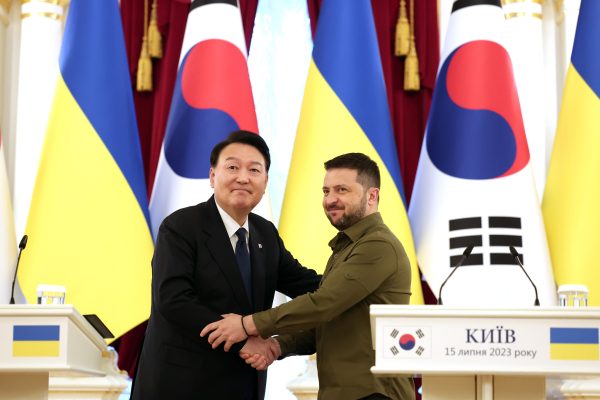WASHINGTON, DC – NOVEMBER 07: Speaker of the House Mike Johnson (R-LA) is joined by Rep. Elise Stefanik (R-NY) and Rep. Cory Mills (R-FL) for a news conference with family members of people kidnapped by Hamas in the Rayburn Room at the U.S. Capitol on November 07, 2023 in Washington, DC. (Photo by Chip Somodevilla/Getty Images)
WASHINGTON — House Speaker Mike Johnson is targeting the end of 2024 for Congress to pass a “significant” package of legislation aimed at curbing China, he said today.
In a wide-ranging speech laying out his foreign policy priorities, Johnson called China “the greatest threat to global peace,” which Congress must counter “with every tool at our disposal.”
“We will build our sanctions package, punish the Chinese military firms that provide material support to Russia and Iran, and we’ll consider options to restrict outbound investments in China,” Johnson said. “We’re working on a piece of legislation to move this fall on that very thing.”
According to Johnson, China is leading an “axis” of adversaries that includes Russia, Iran, North Korea, Venezuela and Cuba — all of which are being influenced by Beijing to stymie US influence throughout the globe.
“They are increasingly using their collective military, technological and financial resources to empower one another in their various efforts to cut off our trade routes and steal our technology and harm our troops and upend our economy,” he said.
Johnson, R-La., is a vocal supporter of likely GOP presidential candidate former President Donald Trump, who has questioned whether the United States should remain in NATO and criticized the level of US funding for Ukraine.
Johnson blasted the Biden administration, which he said “doesn’t treat China as an enemy” and has not shown adequate support of Israel, contrasting it with Trump’s approach to national security. At the same time, Johnson also voiced broad support for NATO and for Ukraine — while leaving plenty of room for himself to modify his views, if needed, to conform to a future Trump administration’s policies.
The House speaker said NATO is an “important organization” that has helped deter war, but that all NATO members must live up to their commitment to spend two percent of their gross domestic product on defense.
“It may even need to be closer to levels during the Cold War. But if we’re all going to enjoy a future of peace and prosperity, we all need to have skin in the game,” Johnson said, adding that he plans to reiterate that point during his discussions with NATO leaders and other delegations in Washington for this week’s NATO summit.
And although Johnson did not lay out whether he would support additional requests for aid for Ukraine, he defended his support of the $60 billion supplemental funding bill for Kyiv, which he successfully shepherded through the House this spring despite opposition from the majority of House Republicans.
Johnson said he believed that Putin “would not stop if he could take Kyiv” and could push Russian troops near the borders of NATO allies like Poland or the Baltic states.
“They’re ruthless, and they’re testing our resolve right now,” Johnson said of Russia. “I really do believe it was a Churchill or Chamberlain moment for our country. I think we did the right thing.”
During his speech, Johnson laid out a three-pronged plan that included:
- Strengthening the domestic economy: Johnson characterized the national debt as the “biggest national security challenge” and said Congress must work to grow the economy while “significantly” reducing government spending. While Johnson didn’t specify what areas Republicans will seek to cut, he said “spending reform” would be a top GOP priority for 2025.
- Improving defense infrastructure: The United States must “rebuild” the military and make key modernization investments to present a credible deterrent to its adversaries, Johnson said. The House Speaker specifically called out the need for more funding for shipbuilding and investments to create new shipyards. The US must reshore certain manufacturing capabilities, protect its domestic supply chains and safeguard the military against across-the-board sequestration cuts, he said.
- Use US economic power to influence partner nations and counter adversaries: Johnson pointed to Congress’s recent passage of legislation that would ban TikTok unless it is sold by its Chinese owners as an example of the economic pressure the US can exact on other nations. The United States must also press Europe “to establish a self sufficient defense industrial base that is less reliant on American assistance,” he said.




















Discussion about this post